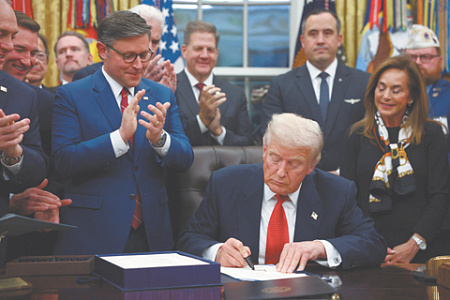
The United States has concluded its longest government shutdown in history, a 43-day impasse stemming from a lack of funding. President Donald Trump, in a celebratory ceremony, signed the temporary budget funding bill, presenting the resolution as a triumph for himself and his Republican allies over the Democratic Party and its perceived obstructionist tactics. Democrats, while largely blaming the President for the shutdown, have simultaneously shifted public attention towards the revived Jeffrey Epstein sex trafficking network case, subtly hinting at Trump’s alleged involvement.
The White House’s official account marked the shutdown’s end with a sardonic epitaph: “Democrat Shutdown, Rest in Peace. October 1, 2025 – November 12, 2025,” accompanied by a video montage of memes targeting the President’s adversaries. Republicans contend that the shutdown was solely a consequence of the Democratic Party’s political ambitions, accusing their faction of withholding budget approval over the inclusion of controversial healthcare subsidies. Republicans argued these subsidies were unnecessary, further straining an already significant budget deficit. The Affordable Care Act, colloquially known as Obamacare, has long been a lightning rod for conservative opposition, and the record-setting shutdown was framed by Trump supporters as further proof of the Democrats’ ill-conceived healthcare policy.
A crucial breakthrough in ending the stalemate occurred days earlier when seven Democrats and one independent senator, typically aligned with them, supported the temporary funding bill in the Senate. House Speaker Mike Johnson, a Republican and staunch Trump ally, urged his colleagues in the lower chamber to follow suit, stating, “They chose principles over personal politics. I strongly urge all my colleagues in the House of Representatives, and that means every Democrat in the House, to think long and hard, to pray, and ultimately do the right thing to help us end the suffering of the American people.” While a simple Republican majority was sufficient for passage, six Democrats ultimately joined the Republicans in voting for the temporary budget, with 207 out of 214 opposing it.
President Trump declared the day the shutdown ended a “great day,” simultaneously highlighting the economic toll on the nation’s economy, estimated at $1.5 trillion. Pro-Republican media outlets have since amplified this narrative, emphasizing the financial damage. In response, Democrats appear to be strategically leveraging media channels to bring renewed focus to the Epstein affair, a topic less favorable to the President. Billionaire Jeffrey Epstein, known to many powerful figures, including Trump, was implicated in the sexual assault of a minor and sex trafficking. He died by suicide in prison in 2019, without naming those who exploited his illicit network.
On the very day the shutdown concluded, Democrats on the House Oversight Committee released three emails written by Epstein in 2011 to an acquaintance. These emails contained complaints about individuals who failed to support the billionaire, and some interpretations suggest they obliquely refer to Trump as a client (calling him “the dog that doesn’t bark”). However, White House press secretary Karoline Leavitt quickly dismissed such interpretations, suggesting the “smoking gun” evidence was less than damning. Nevertheless, if public sentiment, already leaning towards blaming Republicans for the protracted shutdown, continues to shift, these renewed allegations could negatively impact Trump’s approval ratings.
Critics and political analysts offer alternative interpretations of the shutdown’s underlying motives. Some speculate it was a calculated move by Trump to push for a temporary budget by Republican forces alone, effectively transitioning the country into a form of single-party rule, or a “Trump dictatorship.” Another argument, surprisingly voiced by Republican ally Newt Gingrich in an interview with The Washington Post, suggested the shutdown was a method to “shrink big government and get back to a balanced budget,” implying that prolonged forced leave for federal workers might lead to permanent reductions in the workforce and, consequently, government expenditures.
Observing these internal US political machinations, commentators in Russian socio-political Telegram channels offered their own perspectives. Authors of the “Mouse in a Vegetable Garden” channel sarcastically remarked, “The way these performances orchestrated by ‘our agent Donald’ affect his country’s image is a rich topic for discussion. It’s true, and the ‘G’ in Trump’s ‘MAGA’ could very well stand for ‘Grotesque’ rather than ‘Great,’” underlining an international perception of US political theatre as increasingly bizarre and theatrical.
